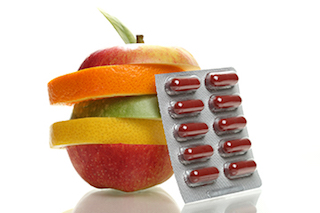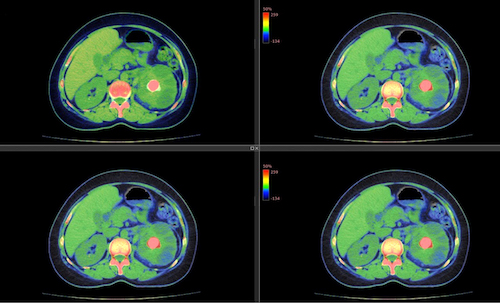7 diet tips to prevent kidney stones
March 30, 2023
Diet and Nutrition; Men's Health; Prevention; Women's Health

If you’ve ever had a kidney stone, you’ll likely do just about anything to avoid having another. Passing a stone can be extremely painful. Some people compare it to the pain of childbirth.
More people are developing kidney stones today than ever before. In the late 1970s, about 4% of people in the U.S. had kidney stones, according to the National Kidney Foundation. The most recent studies show that number has risen to 10% of Americans. Texas is part of the “Stone Belt,” where the rate of kidney stones is even higher. People living in the South are more prone to stones, likely because our warm weather makes us more susceptible to dehydration.
Kidney stones are formed by crystals that can block urine flow. Most commonly, they leave the kidney by traveling down the ureters, which are the tubes that carry urine from the kidneys to the bladder. Stones are more likely to form in highly concentrated urine – too many crystals in too little liquid – which can make the urine look dark yellow instead of straw colored or clear.
Though they often start out the size of a grain of sand, kidney stones can grow to fill the inside of the kidney. The bigger they are, the more difficult they are to pass. Stones can form from a variety of minerals, but the most common is calcium oxalate.
The bad news is that once you’ve had one stone, you have a 50% chance of having another within the next 15 years. Recurrent stone formation can result from a range of causes, from uncontrollable factors like family history and underlying kidney disease to obesity, dehydration, and dietary choices.
The good news is that many risk factors for recurring kidney stones are within your control, and small changes in your diet can make a big difference. Here are seven tips related to foods and beverages that can reduce your chances of developing another kidney stone.

1. Drink water – and then drink more!
If you have already made a kidney stone, the best way to prevent further stones is to drink more fluids. Staying hydrated dilutes the urine, so crystals can’t clump together and become stones.
A 2015 meta-analysis from the National Kidney Foundation found that people who produced 2 to 2.5 liters of urine daily were 50% less likely to have a kidney stone than those who produced less.
People who have had kidney stones should drink a lot of water – at least 2 liters (8 cups) a day, but ideally 3 liters (12 cups). When it’s hot outside, or if you work in a hot environment, you should drink even more water because the more you sweat, the less urine you produce.
If plain water is too bland for you, boost your prevention efforts by adding a squeeze of citrus juice. Lemons, limes, and grapefruits contain citrate, which binds to calcium and helps block stone formation. You could also substitute some of your water for citrus beverages such as orange juice.
2. Limit your sodium intake

A high-sodium diet increases the amount of calcium in your urine. This can trigger kidney stones in people who are already susceptible to them. Follow federal guidelines that recommend limiting your sodium intake to 2,300 milligrams daily.
Reducing sodium, or salt, also benefits the kidneys by helping to lower blood pressure. Chronic high blood pressure can narrow and weaken the blood vessels in the kidneys, reducing blood flow. Over time, that can make the kidneys stop working properly, leading to kidney disease or kidney failure.
3. Eat calcium-rich foods

It may seem counterintuitive to recommend calcium when most kidney stones are made of a form of that mineral. But some stones are made from calcium and oxalate, which is found naturally in a variety of foods including fruits, vegetables, nuts, grains, legumes (like black beans or peas), chocolate, and tea.
Calcium from the food you eat combines with oxalate in your intestines, forcing the oxalates into your feces instead of your urine and reducing the risk of developing calcium oxalate stones.
But you won’t see this benefit from taking calcium supplements. To get the best results, try to consume 1,000-1,200 milligrams of calcium a day from dairy products, soy products, beans, seeds, fortified tofu, and some green vegetables such as kale and broccoli.
4. Cut back on meat

Eating too much animal protein can increase your risk of developing kidney stones. This doesn’t just mean red meat. It also includes chicken, pork, fish, and eggs.
You don’t have to become a vegan or vegetarian – just limit your meat intake to 8 ounces a day. A serving should be no bigger than a pack of playing cards. Heart-healthy eating plans such as DASH (Dietary Approaches to Stop Hypertension) or the Mediterranean diet limit meat intake and can help reduce your risk of forming kidney stones.
Related reading: 9 diet fads to try (or skip completely)
5. Eat your fruits and veggies

A diet rich in fruits and vegetables can lower blood sugar and blood pressure, reduce the risk of heart disease and stroke, and prevent some types of cancer.
It also can help prevent the formation of kidney stones by increasing urinary citrate, a naturally occurring acid in the body that prevents calcium bits from sticking together in your urine and forming stones. So, if you need an added incentive to make sure you’re getting your five portions of fruit and vegetables every day, remember that it can help prevent the excruciating pain of another kidney stone.
6. Be cautious with vitamin C supplements

Vitamin C is beneficial to your overall health. However, a study published in JAMA Internal Medicine found that men who ingested vitamin C supplements of 1,000 mg a day or more were at increased risk for kidney stones. It’s not tough to find supplements with this outrageous amount of vitamin C – that’s more than 10 times the recommended daily amount (75mg for women; 90 mg for men)!
Those findings are specific to vitamin C supplements. The same was not seen when vitamin C was consumed through food, which is always the best source.
7. Watch your oxalate

High levels of oxalate in the urine can contribute to kidney stone formation. However, oxalate is found in many healthful foods, such as spinach, beets, nuts, wheat germ, rhubarb, and soy. Rather than eliminating high-oxalate foods, eat a varied diet and drink extra water, or eat a serving of dairy when you consume foods high in oxalate.
All of these are general recommendations for kidney stone prevention and should not supersede any specific dietary recommendations from your health care provider. A metabolic evaluation by a urologist can help determine the specific reasons you have kidney stones.
Treating kidney stones
There is no single diet plan for stone prevention, and it can be hard to change the way you eat and drink. But you don’t have to do it alone. Our registered dietitians can help you make the necessary changes.
If you do develop a kidney stone, a doctor can determine its size and shape through X-rays, ultrasounds, or CT scans to decide whether it’s small enough for you to pass without treatment. If the stone is too large to pass, or if blood and urine testing show an associated bladder infection or kidney damage, you may need a procedure to take care of the stone and other concerns.
UT Southwestern kidney specialists perform more than 1,100 procedures each year to remove kidney stones, using two primary methods:
- Ureteroscopy with laser lithotripsy: For small to medium-sized stones, we can insert a small scope with a laser into the ureter to break up the stone into small, passable pieces.
- Percutaneous nephrolithotomy: For large or complex stones, we pass a scope into the kidney through a small incision in the back. The surgeon will fragment the stone with a laser and remove the pieces.
Most risk factors for calcium oxalate kidney stones can be controlled through small, healthy adjustments to your diet and daily water consumption. Working together with our urology providers and registered dietitians, you can significantly decrease your chances of suffering from another kidney stone.
To discuss your kidney health, call 214-645-8300 or request an appointment online.

Schedule an Appointment Now with Megan Bollner, M.P.A.S., PA-C
Existing patients may also schedule an appointment using MyChart.











